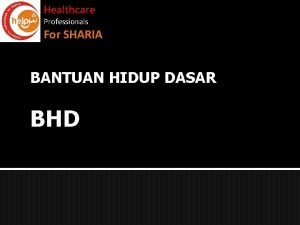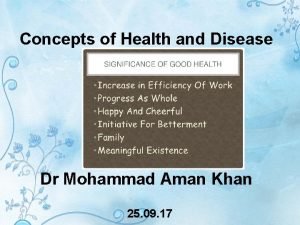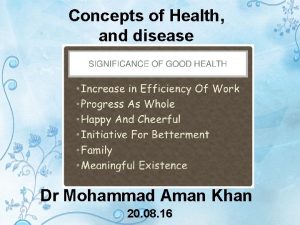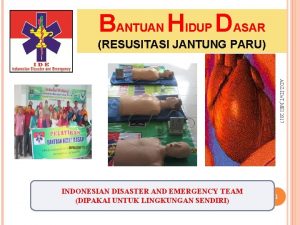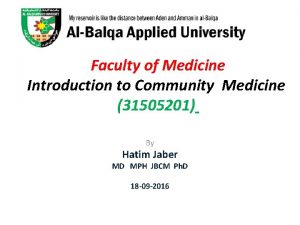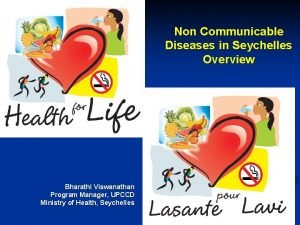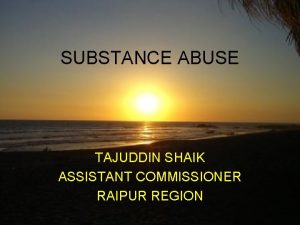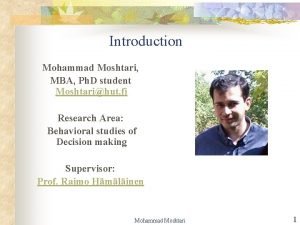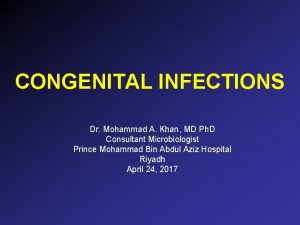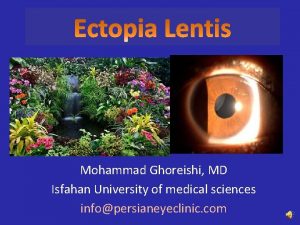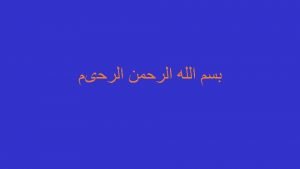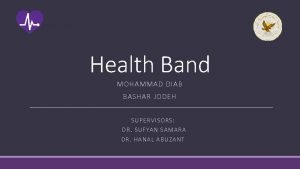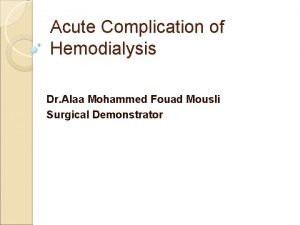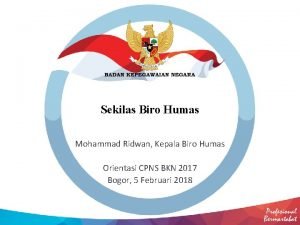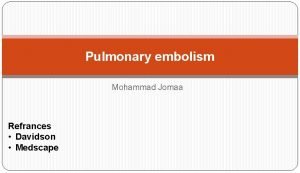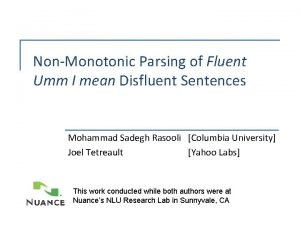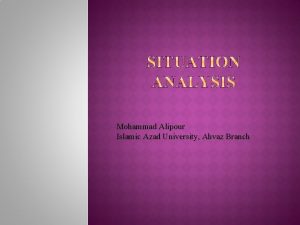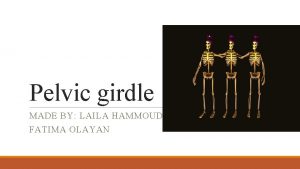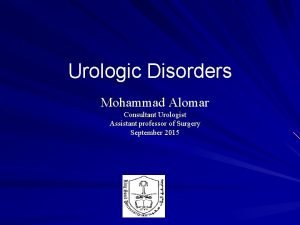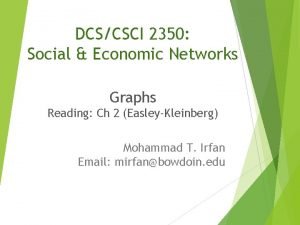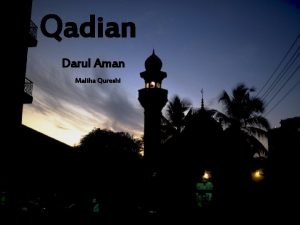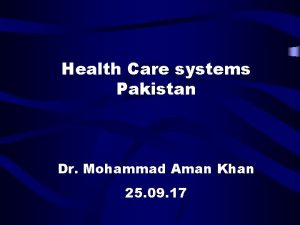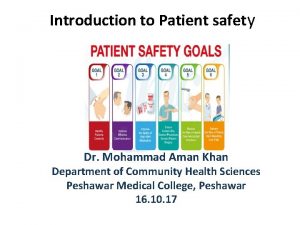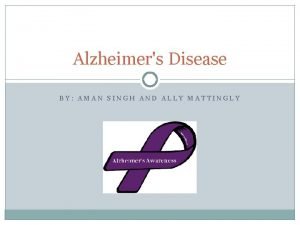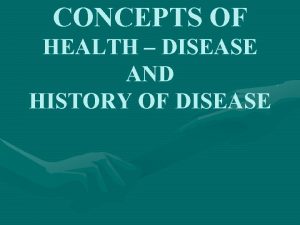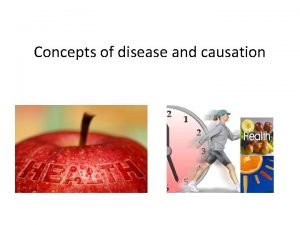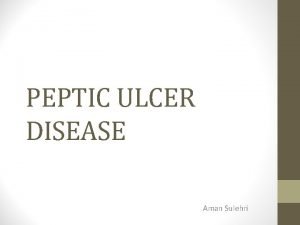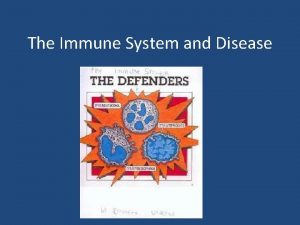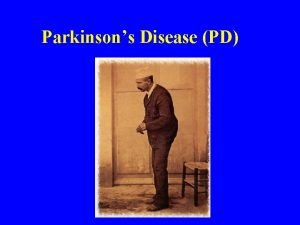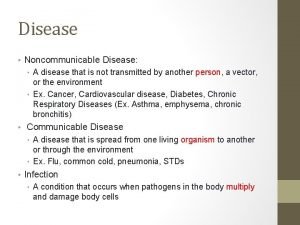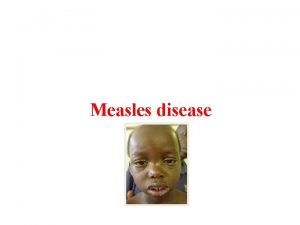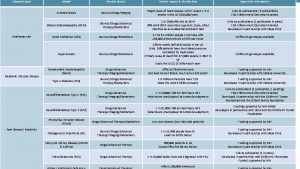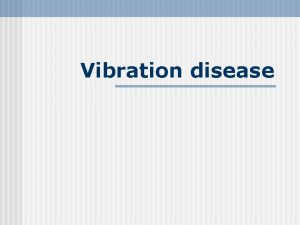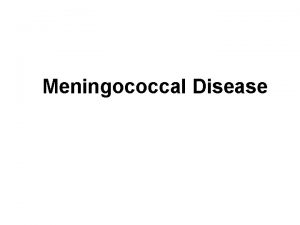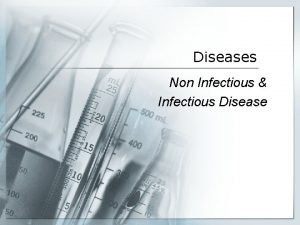Concepts of Health and disease Dr Mohammad Aman






























- Slides: 30

Concepts of Health, and disease Dr Mohammad Aman Khan 20. 08. 16

After the end of this lectutre the student will be able to know: • What is health and disease • Different dimensions of health • Various models of health. • Identify factors affecting health status • Differentiate illness from disease • and acute illness from chronic illness.

What is Health? • What are the determinants of Health?

What is Health • “Health is state of complete physical, mental, spiritual and social well being and not merely the absence of disease” and the ability to lead a socially and economically productive life” WHO

Trauma Physical Thermal Electrical Mental Social Spiritual Environmental

Health-Illness Continuum • Measure person’s perceived level of wellness • Health and illness/disease opposite ends of a health continuum • Move back and forth (forward) within this continuum day by day • Wide ranges of health or illness Copyright 2008 by Pearson Education, Inc.


Illness and Disease • Is a highly personal state in which the person's physical, emotional, intellectual, social, developmental, or spiritual functioning is thought to be diminished. • Illness is usually associated with disease but may occur independently of it. • Illness is a highly personal state in which the person feels unhealthy or ill.

Dimensions of health Physical Mental Emotional Spiritual

Physical. • The ability to carry out daily tasks, achieve fitness (e. g. pulmonary, cardiovascular, gastrointestinal), maintain adequate nutrition and proper body fat, avoid abusing drugs and alcohol or using tobacco products, and generally to practice positive lifestyle habits.

Mental • The ability to interact successfully with people and within the environment

Emotional. • The ability to manage stress and to express emotions appropriately, • Emotional wellness involves the ability to recognize, accept, and express feelings.


Spiritual. • The belief in some force (Allah, nature, science, religion, or a higher power) that serves to unite human beings and provide meaning and purpose of life.

Intellectual. • The ability to learn and use information / skills effectively for personal, family, and community development.


• Disease ü Disease can be described as an alteration in body functions resulting in a reduction of capacities or shortening of the normal life span. ü The causation of a disease is called its etiology.

There are many ways to classify illness and disease: • Acute illness is typically characterized by severe symptoms of relatively short duration. • A chronic illness is one that lasts for an extended period, usually 6 months or longer, and often for person's life.

Preventable Causes of Disease BEINGS Biological factors and Behavioral Factors Environmental factors Immunologic factors Nutritional factors Genetic factors Services, Social factors, and Spiritual factors [JF Jekel, Epidemiology, Biostatistics, and Preventive Medicine, 1996]


Arriving in the midst of an obesity epidemic, this new ata-glance guide to healthful eating is meant to remind consumers to limit heavy foods and beef up on the greens. Desserts have been banished to the desert.

Heat wave death toll in Karachi reaches 1260 (June 2015)

Daily Mashriq 20. 8. 15

Dengue in Swat KP in 2013 -2015 2013 2014 2015 More than 200 4 -6 so far 2000 2016

Health-Illness Continuum • Measure person’s perceived level of wellness • Health and illness/disease opposite ends of a health continuum • Move back and forth (forward) within this continuum day by day • Wide ranges of health or illness Copyright 2008 by Pearson Education, Inc.


Behavioral factors for disease Stampede for food kills 18 in Pakistan



• Thank You
 Aman diri aman lingkungan aman pasien
Aman diri aman lingkungan aman pasien Dr mohammad aman
Dr mohammad aman Dr mohammad aman
Dr mohammad aman Aman pasien aman lingkungan
Aman pasien aman lingkungan Definition of concept of health
Definition of concept of health Concepts of health and disease
Concepts of health and disease Bharathi viswanathan
Bharathi viswanathan Shaik mohammad tajuddin
Shaik mohammad tajuddin My.edu.sharif
My.edu.sharif Mohammad ali javidian
Mohammad ali javidian Dr nur mohammad hadi zahalan
Dr nur mohammad hadi zahalan Pearo-nn
Pearo-nn Dr mohammad khan
Dr mohammad khan Mohammad sharifkhani
Mohammad sharifkhani Mohammad sharifkhani
Mohammad sharifkhani Mohammad ghoreishi
Mohammad ghoreishi Anovulation who classification
Anovulation who classification Dr. mohammad diab
Dr. mohammad diab Mohammad sharifkhani
Mohammad sharifkhani Alaa mohammad fouad
Alaa mohammad fouad Vlsi
Vlsi Mohammad arjomand
Mohammad arjomand Mohammad ridwan bkn
Mohammad ridwan bkn Modified wells score
Modified wells score Mohammad sadegh rasooli
Mohammad sadegh rasooli Mohammad alipour
Mohammad alipour Mohammad keshavarz
Mohammad keshavarz Bones of pelvic girdle
Bones of pelvic girdle Mohammad alomar
Mohammad alomar Mohammad ali abtahi
Mohammad ali abtahi Mohammad irfan bowdoin
Mohammad irfan bowdoin
